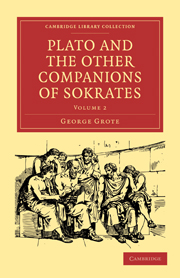CHAPTER XXIX - KRATYLUS
Published online by Cambridge University Press: 05 October 2010
Summary
Persons and subject of the dialogue Kratylus—Sokrates has no formed opinion, but is only a Searcher with the others
The dialogue entitled Kratylus presents numerous difficulties to the commentators: who differ greatly in their manner of explaining, First, What is its main or leading purpose? Next, How much of it is intended as serious reasoning, how much as mere caricature or parody, for the purpose of exposing and reducing to absurdity the doctrines of opponents? Lastly, who, if any, are the opponents thus intended to be ridiculed?
The subject proposed for discussion is, the rectitude or inherent propriety of names. How far is there any inherent propriety of names. How far is there any natural adaptation, or special fitness, of each name to the thing named? Two disputants are introduced who invoke Sokrates as umpire. Hermogenes asserts the negative of the question; contending that each name is destitute of natural significance, and acquires its meaning only from the mutual agreement and habitual usage of society. Kratylus on the contrary maintains the doctrine that each name has a natural rectitude or fitness for its own significant function:—that there is an inherent bond of connection, a fundamental analogy or resemblance between each name and the thing signified. Sokrates carries on the first part of the dialogue with Hermogenes, the last part with Kratylus. He declares more than once, that the subject is one on which he is ignorant, and has formed no conclusion: he professes only to prosecute the search for a good conclusion, conjointly with his two companions.
- Type
- Chapter
- Information
- Plato and the Other Companions of Sokrates , pp. 501 - 551Publisher: Cambridge University PressPrint publication year: 2010First published in: 1865



